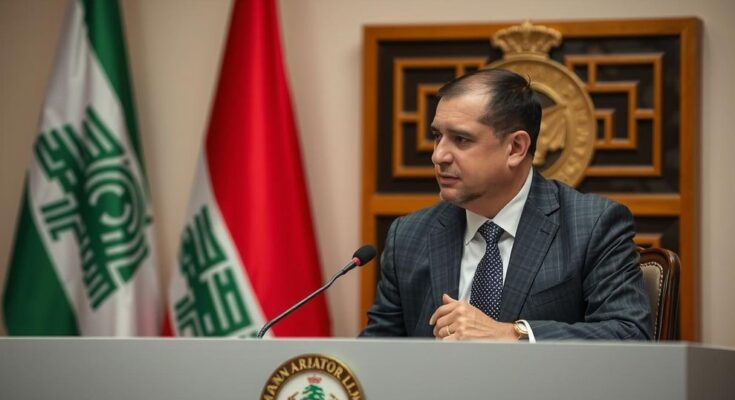HTS leader Ahmed al-Sharaa stated that Syria will not interfere negatively in Lebanon, promising to respect its sovereignty. This declaration comes amid efforts to normalize relations post-civil war, marking the first meeting between Lebanese Druze leaders and Syria’s new leadership. The historical context highlights Syria’s past influence in Lebanon and the refugee impacts since 2011.
Hay’at Tahrir al-Sham (HTS) has declared that Syria will refrain from “negatively” intervening in the affairs of Lebanon, as stated by their leader, Ahmed al-Sharaa, during a meeting with a delegation of Druze leaders on Sunday. Sharaa committed to respecting Lebanon’s sovereignty and maintaining the integrity of its territory along with its independence and security stability. This statement is part of HTS’s broader effort to reformulate Syria’s relations with its neighbors following over a decade of civil conflict.
Sharaa emphasized that Syria intends to maintain a neutral stance concerning Lebanese matters, acknowledging that historically Syria has been perceived as a “source of fear and anxiety” within Lebanon. Relations between Syria and Lebanon have been closely entwined for many years, notably during Syria’s military presence in Lebanon from 1976 until 2005. The ongoing Syrian civil war has led to an influx of Syrian refugees into Lebanon, significantly impacting both nations.
This meeting also marks a significant moment, as the Druze leader Walid Jumblatt is the first Lebanese leader to engage with Syria’s new leadership after the recent governmental changes. The Druze community has faced considerable challenges in Syria, encountering hostility from various factions, prompting the need for increased dialogue between the two nations. Furthermore, HTS, previously known as Jabhat al-Nusra, has a controversial history with the Druze, having been involved in sectarian violence in the past.
The backdrop to HTS’s statement involves Syria’s contentious history with Lebanon, where the two countries have shared a complex relationship influenced by conflict and political maneuvering. Since the Syrian civil war began in 2011, the refugee crisis has strained Lebanon, with hundreds of thousands seeking safety across the border. HTS seeks to reposition itself within the region while emphasizing a non-aggressive stance towards Lebanese affairs, in light of their controversial past and current geopolitical dynamics.
In summary, HTS’s commitment to non-intervention in Lebanon reflects an attempt to normalize post-conflict relations amidst a fraught historical backdrop. This move is indicative of ongoing efforts to stabilize Syria’s position in the region while addressing the concerns of Lebanese leaders. The evolving dynamics between the two nations will require careful navigation, especially given the history of sectarian violence and the complexities stemming from the Syrian civil war.
Original Source: www.middleeasteye.net




